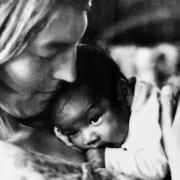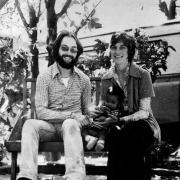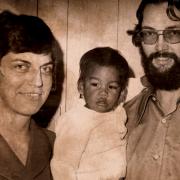God comes to us in many ways. Sometimes we are keenly aware of God’s presence; at other times we just don’t pay attention. I’d like to tell you about some of the extraordinary places God has met me and how, when my life became most difficult, God found me in a new way.
As a preteen, after hearing a missionary report on a Sunday service at Rosthern Mennonite Church, something remarkable happened to me. I don’t remember where the missionaries were from or what they said,but I had a clear sense that God was preparing me for international service.
What makes this remarkable is that up to that point in my life I was not able to stay away from home for even a single night because of loneliness.
I remember sitting in the family car later that day, with warmth and sunlight all around when a verse I had memorized came to mind: “And everyone who has left houses or brothers or sisters or father or mother or children or fields for my sake, will receive a hundred times more an will be given eternal life” (Matthew 19:29). I figured I’d be looked after, but I couldn’t have imagined how great that caring would be.

The second time I felt God meet me with a particularly vivid presence, I was 16 and studying the church’s catechism. Early in the class, we had memorized answers to prescribed questions. That did not work for me. Later, as we discussed the content of questions and answers, the experience became more life-giving.
At some point during the catechism, I had a sense that God was inviting me to become a pastor. My father had studied scripture with me the winter before, and I felt affirmed in my interests and desire to care for people. But when I shared this vision with the pastor leading the class, his response was swift: “Women don’t do that!” It was 1966.
That was all I needed to set my resolve to be open to God’s promptings, whatever the outcome. I also waited another year to receive baptism with a pastor who affirmed the gifts God had given me.
I did eventually become a pastor, but by a circuitous route. International service came first.
Wally Ewert and I served with Mennonite Central Committee (MCC) in Vietnam from 1973 to 1975, during the final years of the war. During our second year, we decided to start our family. Little did we know that as we were taking this decision, our first child was being born.

The next afternoon, missionary friends drove onto our compound. Moments later, Wally called out from the front room, “Clair, do we want a baby?”
My immediate response was, “Yes!” And then, “Is it a boy or a girl?”
As we unwrapped the long cloth smelling of wood fire we met our first-born child: a boy.
We learned that his mother died giving birth. This child was the third son in the family. It was the custom in his tribe to bury a motherless child with their mother.
When his father was asked if he would like our friends to find a family to care for his infant, he chose life for his son. His son would have a future that he could never imagine in a place he would never visit. Additionally, if some military activity or measles epidemic were to come to this village after this decision, villagers would hold him responsible because he had gone against the mores of the tribe.
What amazing love this father demonstrated—God’s agape-like love. That father’s act of love and risk—to entrust his son to strangers at the risk of censure from his tribe— humbles me still.
God’s love is unearned, gracious and constantly seeking the benefit of the other.
Wally and I had stepped into a life larger than our own, committed to experiences and demands we could not anticipate.
In April 1975, the war was ending, and we were advised by Canadian Consular staff to leave Vietnam as soon as possible. That night, I was tempted by panic. I feared we might have to leave our son behind or stay and live a life we were not prepared to navigate.
I turned to the scriptures for comfort. The index of my study Bible suggested reading Hebrews 11 when in trouble. “Faith is the assurance of things hoped for, the confidence in things not seen,” I read. I begged God for such faith.
That night, I dreamt we were evacuated from Vietnam. I had little idea what that meant, but it gave us the confidence to visit Vietnamese government offices in search of a travel document for our child. To no avail.
In desperation, we turned to our last resort. We visited the Canadian Consulate and learned a Canadian Forces cargo plane would airlift Canadians from the country the next day.
At the airport the next afternoon, we waited as Canadian diplomats tried to secure permission for dependents of Canadian citizens to leave. The sun was getting low, and the flight crew were anxious because they had seen gunfire at ground level as they flew in. The flight was now considered a combat mission.
Finally, we learned that only Canadian citizens and 63 orphans from Cambodia had permission to leave. We stood in the departure lounge holding our son, feeling desperately helpless. Then a member of the flight crew came to us and said he would get our son on board. He took our boy and, like a man on a mission, walked out through the gate. Despite the Vietnamese airport staff calling after him, he disappeared into the C-130 Hercules with our son.

I thought of our son’s birth father; is this how it felt to love another so much that you are willing to give them up to the unknown? Is this how God feels each time we humans make frightening decisions?
As the aircraft lumbered off to Hong Kong, we knew such relief and joy!
Back in Canada we had to figure out how to dress a toddler for a Canadian winter. Most challenging, though were the racially motivated comments and criticisms and inter-national adoption. We believed we were living within the purposes God had for our lives, but that didn’t always make life easy.
Eleven years later, we returned to Asia, this time the Philippines. Our family of four – we had a daughter in the interim – served five years with MCC there. Upon returning to Saskatoon in December of 1990, the most difficult and life-transforming time began.
Money was tight. We were able to sell our farmland before the bank foreclosed, and Wally secured work with the Saskatchewan Wheat Pool. On the third Monday of his new career, a member of the cleaning staff found him slumped over his desk. His heart had stopped.
His mother had died of a heart condition at a similar age.
Our two teenagers and I would have to go it alone. Life was not turning out the way I had hoped.
I had stopped praying some time earlier. Our departure from the Philippines had been difficult. Our family’s living arrangement there had become unsatisfactory. The attempts to find meaningful and appropriate assignments for us became increasingly difficult.
My personal spiritual life had become confused. I could no longer find an understanding of God that made sense to me, so I sought out a spiritual director. She recommended I return to an earlier image of God as Father.
I had thought God would care for us as we worked with God’s people, but it felt like God was not listening. With the complexities of our departure, I ceased to pray. And now with the unexpected death of Wally, I simply could not pray.
We made it through our primary grief with the support of family and a care group from church. The kids each selected a mentor who provided a safe place to process their losses.
One morning, several weeks after the funeral, I was cleaning the dining room floor in our big old farmhouse. The sunlight from the south windows danced with the dust particles. Unprompted, I heard the words: “Underneath are the everlasting arms.”
I couldn’t quite place the phrase—it’s from Deuteronomy 33:27—but the meaning of the words filled me with hope. I was not alone. I was still a person of value.
I heard this message in God’s voice; I heard it as grace unbounded. Something new was happening. It must have been the prayers of others that sustained me.
It was safe to grieve because I was safely hidden in God’s loving presence.
Four months later, I began my studies at Lutheran Theological Seminary in Saskatoon. I also signed up for workshops in spirituality at Queen’s House of Retreats. There, I was introduced to contemplative spirituality.
Contemplative prayer is prayer which is not primarily saying words or thinking thoughts. It’s an encounter. Whenever we are aware of God’s presence, it’s a prayer. It’s a way of living in the presence of God, with awareness of God’s presence. The contemplative secret is learning to live in the now.
Some of my well-used prayer blogs begin this way: “I pause to be still; to breathe slowly, to re-centre my scattered senses upon the presence of God.” “Become aware of God’s gaze of love upon you.”
Prayer is a matter of waiting in love. Returning to love. Trusting that love is the deepest stream of reality. It’s primarily an attitude, a stance. This attitude is about attention to details, of life around and within.
I was introduced to praying with scripture, sometimes imagining myself in the biblical story, sometimes hearing the text as a love letter from God. Intimacy with God grew.
By paying attention to the events of the day and my corresponding emotions, I became aware of God leading me, drawing me toward a particular path in life. But the most life-giving practice was meeting with my spiritual director. Speaking with someone who practices listening for God taught me how to identify God’s voice and see God at work in the ordinariness of life. My spiritual director introduced me to a language for speaking to and about God.
It wasn’t long before I found myself falling in love with God. I’d probably been in a love relationship with God for many years already, but, increasingly, time spent with God took on a new dimension.
I thrilled at the time with God in prayer. I saw God in most every aspect of my life, not just in prayer and in scripture, not just in people but also in the natural world. I felt a sense of God’s presence enfolding me.
A well-known Franciscan spiritual leader, Richard Rohr, suggests love is not something we do, but rather something that is done to us, and then we join in. It’s something into which we fall. God first loves us, and when we get in touch with that love, we can choose to participate in it as well. Living in God’s love expands our world, enlivening our holy imaginations.
God comes to us in many ways. My husband Garth (we married in 1993) and I live in a townhouse surrounded by trees a block from the South Saskatchewan River. On weekday mornings when our 4- and 5-year-old grandchildren bounce into our home at 6:30 a.m. for their hugs with a side order of oatmeal porridge, we give thanks for God who is love. God who loves unconditionally enables us to love and to know the joy in it.
Our story began with sensing God in our holy imaginations, prompting us to take risks for God’s good news of love. We experienced this self-giving love most powerfully in a widowed father of three. We experience this love each day. There really is nothing that can separate us from God’s love in Jesus Christ (Romans 8:38,39). Thanks be to God.
Claire Ewert Fisher is a part-time pastor at Rosthern Mennonite Church.



Add new comment
Canadian Mennonite invites comments and encourages constructive discussion about our content. Actual full names (first and last) are required. Comments are moderated and may be edited. They will not appear online until approved and will be posted during business hours. Some comments may be reproduced in print.